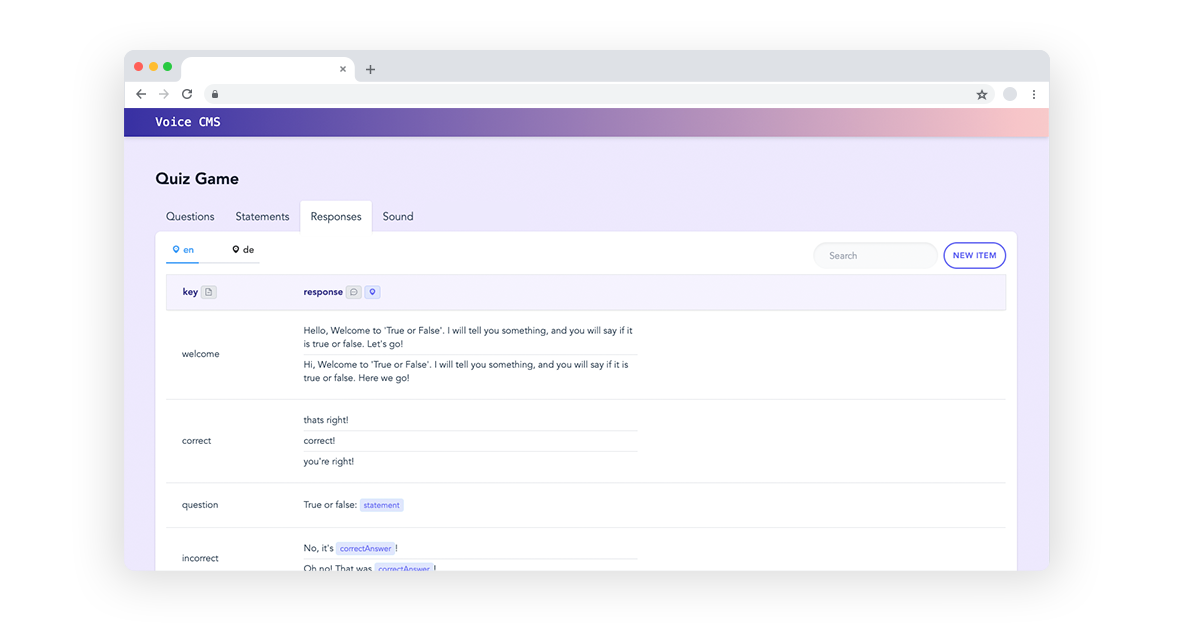A content management system for voice apps like Alexa Skills and Google Actions.
The goal of this open source project is to make it easier to manage content for voice platforms like Alexa and Google Assistant. The CMS can be hosted on your own servers so that you have full control of the data.
Features include:
- Collections: Create various collections with different schemas, e.g. responses, business data
- Content Types: Supports different types of content, e.g. text, images, audio, and checkboxes
- Localization: Select which content types should be localized, e.g. en, de
- Randomization: Add content variations that are randomly picked by the voice app
- Jovo Plugin: Integrate CMS content with apps built with the Jovo Framework
This repository consists of the following elements:
api: API that handles database calls and structures data. Built with Express.js.client: The CMS frontend. Built with Vue.js and Element UI.
The plugin for the Jovo Framework can be found here: pialuna/jovo-plugin-voicecms.
A sample Jovo app, that uses the Voice CMS Plugin can be found here: pialuna/jovo-sample-app-voicecms.
In the root directory of the project, run:
npm installThis will install all dependencies for the api and client.
Voice CMS needs to be connected to a MongoDB database. You can either run your own or create a free database at MongoDB Atlas.
First, create a .env file based on the .env.example file inside /api:
cd api
cp .env.example .env
Add your MongoDB Atlas Database URI to the .env:
MONGO_URI=<your-mongodb-uri>
You can then start the server:
npm startTo start the Vue.js frontend application, do the following:
cd client
npm run devThen go to localhost:8080 to view the app.
Install the Jovo Framework plugin in your Jovo Project like this:
npm install --save jovo-plugin-voicecmsYou can find the full documentation for the plugin here: pialuna/jovo-plugin-voicecms
A Voice CMS project contains one or more collections. A collection represents a specific content schema that is used by the voice app. It can be seen as a table that has at least two properties that are represented as columns.
For example, a Responses collection may be used to manage the voice app's responses. It includes two columns:
- A
keyused as identifier (a basic textfield) - A
responsetext array field that contains the app output
Each row can be edited. More elements can be added to the responses array as well:
Each collection consists of at least two properties (columns) that can have different types.
The following property types are supported:
- Text Array: Typically used for responses, if more than one value is available, the voice app selects a random item. Can contain
{{variables}} - Textfield: A regular one line short text, e.g.
key - Audio URL: A URL that is displayed as an audio element
- Image URL: A URL that is displayed as an image
- Tags: One or more tags
- Checkbox: A boolean value that is displayed as checkbox
- Boolean: A boolean value that is displayed as switch, showing 'true' or 'false' as words
- Date: A date picker
- URL: A clickable URL
For example, URLs and audio URLs are displayed like this:
Booleans and checkboxes look like this:
Voice CMS supports internationalization, which means that its content can be translated into multiple languages.
For the voice app's Responses collection, you won't need a column for each locale - just tag the response column as an i18n property.
Then there will be a toggle to switch conveniently between locales, even while editing an item, like in this example:
The columns with internationalization are marked with the locale icon in the table header.
As a JavaScript object, a content item looks like this:
// an item of the Quiz Statements collection
{
_id: "4cnz4c8778t8z3z7t37n8",
collection_id: "z5vz48778t8z3z45zv090",
data: {
key: "qs0",
i18n: {
statement: {
en: ["Mount Everest is the tallest mountain in the world. "],
de: ["Mount Everest ist der höchste Berg der Welt."]
}
},
answer: true,
live: true
}
}All properties with internationalization are in a nested i18n-object.
The API contains the following endpoints:
localhost:1234/projects
/projects/:id
/collections/
/collections/:id
/items/
/items/:id
To get a complete project (with all its collections and with all items of each collection), send GET to /projects/<your-project-id>?complete=true. The Jovo Plugin gets the data of a project this way.





